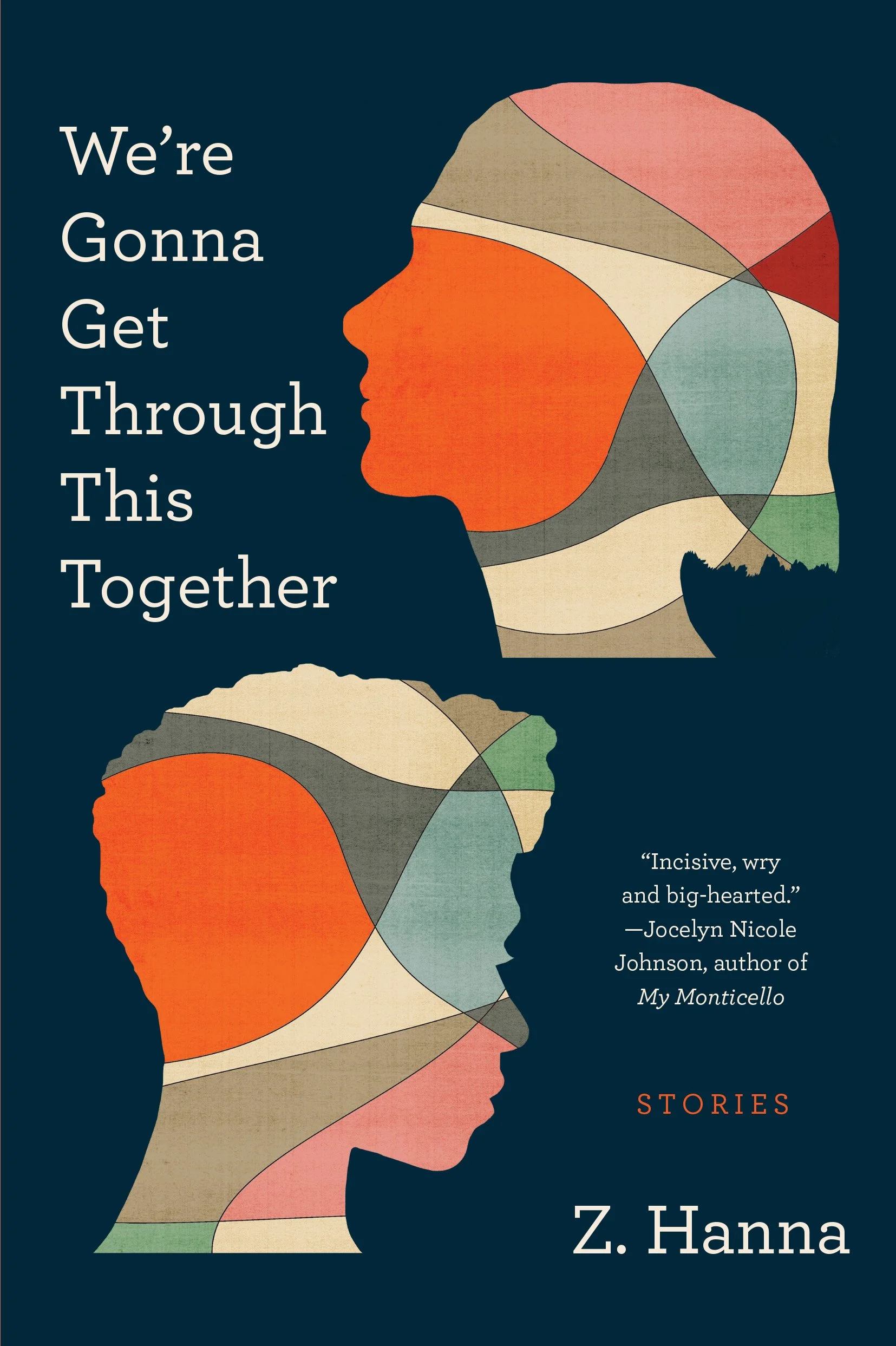The satirical, the earnest, and the politics of activism
Review of Z. Hanna’s We’re Gonna Get Through This Together
by Norah Vawter
Z. Hanna’s debut book, We’re Gonna Get Through This Together (Modern Artist Press, March 2025), is a smart, lyrical, and incisively witty short story collection about the murky waters we find ourselves in when we try to fight against injustice and search for a place to belong. At once satirical and earnest, this collection explores race, class, gender, sexuality, and the politics of activism. It’s a genuinely funny book, I laughed out loud on a number of occasions, and the humor is relatable whether it’s cringey, quirky, or sweet. Hanna is excellent at observational humor, at pointing out the absurdities in human behavior, social groups, and societal structures, while showing genuine affection and compassion for these fictional characters. But this book is also an exercise in making the reader uncomfortable. In a good way.
Z. Hanna is a nonbinary writer from Washington, D.C. who has a B.A. from Middlebury College and an M.F.A. from the California Institute of the Arts. A leftist who is interested in supporting but also criticizing the left when necessary (and of course the right), Hanna walks an interesting tightrope in these stories as they satirize both the heroes and the villains, providing commentary on activism, hypocrisy, and the tricky business of trying to do the right thing. We’re Gonna Get Through This Together is not a perfect book, but it’s very good and signals a writer of great potential.
The author’s imagination, wit, and emotional and genre range are on full display as their stories stray from realism to surrealism and even speculative fiction. One of the most grounded pieces is “Fundraising Pitch.” An old white man in a retirement home becomes newly political in the early days of the pandemic and Black Lives Matter, and tries to raise money for liberal causes. It’s a story of awakening, identity, and awkward self growth told in letters, a one-way communication that becomes increasingly desperate and vulnerable as the letter writer tries to do and say the right thing but often falls short. I found this story particularly emotionally resonant—perhaps because this protagonist is not as self-aware and self-reflective as characters in other stories, and so his feelings seem less filtered.
“Jessica—whose bun is frizzy and under-eyes are dark—bangs surprisingly hard on the ceremonial gong. … Her voice cracks, and for a second, I see it, the reason why Ray responded to this straight white woman’s retreat invite in a random DM—beneath the requisite de-souled person is, actually, someone who cares.”
In “Heroes’ Journey,” a trans couple joins other climate activists at a desert retreat to use psychedelic trips to heal the planet through “consciousness spelunking” that will achieve “actionable insights.” This activism seems silly, medically dangerous, and even performative. And yet, in the midst of the zaniness and hypocrisy, we see something beautiful. Even pure. Some of these activists really care, possessing a sincerity and determination to save the world that transcends personal limitations. It’s a theme Hanna returns to over and over again: the gap between our aspirations and the reality of our actions.
Author Z. Hanna
“Flaming” is a powerful narrative about diet culture, shame culture, and consumerism that starts off slow but gets really good, taking us in surprising, even profound directions. But some stories achieve an opposite effect. In the titular story, “We’re Gonna Get Through This Together,” a white lesbian anti-racist clashes with her Mexican-American girlfriend about how to do anti-racism correctly, analyzing and overanalyzing everything. This story started out strong and tight but petered out towards the end. I wasn’t sure what the final point or takeaway was. Hanna does seem to struggle with endings at times (a struggle I can relate to as a fiction writer), but this lack of conclusiveness may also be intentional. Throughout the book, Hanna returns to the theme of knowing and not knowing, how it’s impossible to have all the answers, to quantify ourselves or our impact, to know whether we’re doing activism (or life) right. Sometimes these stories are meant not to satisfy but instead to engage the reader in active analysis and self reflection. At times I found myself questioning my own reactions. Was I thinking about this element “correctly”? Should I have this reaction?
“‘We could call it Racism Peer Support or White Guilt Therapy or something,’ she said. ‘Make it sliding scale.’
’I don’t hate it,’ I said back, the stress about my job feeling a little less clumpy. ‘But are you really sure you want to spend all that time with white people? We’re not a very cool people.’”
In the final, probably strangest and most ambitious story in the collection, “The Birmingham Effect,” a prison guard struggles with the stress and moral ambiguity of working at an “elective prison” where rich men check themselves into prison as if it were a hotel, subjecting themselves to varying levels of abuse and cruelty. Prison has become a fetish, or a way to live out a tough guy fantasy, and though the corporation running things claims wokeness, its progressive ideals ring hollow and its guards have limited agency, making them seem like a different sort of prisoners. Though I struggled with the logic of this conceit, I was fascinated and compelled by the emotional rollercoaster and the critiques of capitalism, race and class struggles, and false progressivism.
A couple stories do fall flat, particularly when the satire is not as grounded in an emotional arc. It can also be difficult to know what is satirical and what is meant in earnest. As a reader, I’m interested in what the writer’s views are, and how much common ground we share. It’s tricky to satirize something one cares about and is cheering on while also critiquing it, and Hanna has taken on a difficult task. But any drawbacks I find in We’re Gonna Get Through This Together are outweighed by the positives. This is a book that stayed with me. I couldn’t stop talking to my husband about it, and once I had spent enough time talking about it, and thinking over the stories, I knew that this needed to be my first review for Washington Unbound.
Z. Hanna gives us no easy answers in their debut book of fiction, instead inviting us to get comfortable with being uncomfortable. Because sometimes … the question is the point. Sometimes you need to sit with a story, not sure what you think, or if you’re thinking about it in the right way, and just breathe.
You can buy a copy of We’re Gonna Get Through This Together directly from the publisher here, or from Lost City Bookstore in D.C. here.
Learn more about the author on their website and by reading this excellent, quirky interview in Daniel Docs.
Z. Hanna is a writer from Washington, DC. They have a B.A. from Middlebury College and an M.F.A. from the California Institute of the Arts. Their debut short story collection We’re Gonna Get Through This Together was published by Modern Artist Press in March 2025.
Norah Vawter is a founder and editor of Washington Unbound. Follow her on Instagram and Threads @norahvawter and check out her Substack, Survival by Words here.


